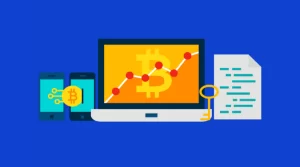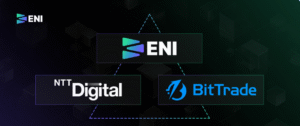
The Impact of DeFi on Traditional Financial Intermediaries
Introduction
Decentralized Finance (DeFi) has emerged as an alternative to traditional financial systems, enabling individuals to access financial services and investment opportunities without the need for intermediaries such as brokers and agents. In this article, we will explore the impact of DeFi on traditional financial intermediaries.
Disintermediation in DeFi
One of the key features of DeFi is disintermediation, which refers to the elimination of intermediaries from financial transactions. In DeFi, financial transactions are executed on a decentralized blockchain, which means that there is no need for intermediaries such as brokers and agents.
This has several implications for traditional financial intermediaries:
Reduced revenue streams:
With the elimination of intermediaries from financial transactions, traditional financial intermediaries may see reduced revenue streams. This is because they are no longer needed to facilitate financial transactions.
Increased competition:
With the emergence of DeFi, traditional financial intermediaries now face competition from a new set of players that operate on decentralized blockchain networks.
Potential for disintermediation:
If DeFi continues to grow and gain popularity, traditional financial intermediaries may face the risk of disintermediation, which could threaten their very existence.
The Future of Traditional Financial Intermediaries in the Age of DeFi
While the emergence of DeFi presents challenges for traditional financial intermediaries, it is important to note that they still have a role to play in the financial system. In fact, some traditional financial intermediaries are already exploring the potential of DeFi and blockchain technology to improve their operations and better serve their clients.
For example, some brokers and agents are exploring the use of blockchain technology to improve the speed and efficiency of financial transactions, while others are exploring the potential of DeFi to create new revenue streams.
The Benefits of DeFi for Users
While DeFi presents challenges for traditional financial intermediaries, it also offers significant benefits for users. These benefits include:
Access to financial services:
DeFi enables individuals to access financial services and investment opportunities without the need for intermediaries, which can be especially beneficial for individuals who are underbanked or live in developing countries.
Greater transparency:
DeFi transactions are executed on a public blockchain, which means that they are transparent and can be audited by anyone with an internet connection. This can help to improve trust and reduce the risk of fraud.
Lower fees:
With no intermediaries involved, DeFi transactions can be executed at a lower cost than traditional financial transactions. This can help to reduce the cost of financial services for users.
Increased control:
DeFi enables users to maintain control over their own assets and investments, which can be especially important for individuals who want to maintain their privacy and avoid the risk of asset seizure or confiscation by governments or other authorities.
Challenges and Risks for Users
While DeFi offers significant benefits for users, there are also several challenges and risks to consider. These include:
Security risks:
DeFi platforms are vulnerable to hacking and other security risks, which can result in the loss of funds for users.
Volatility:
DeFi assets can be highly volatile, which can lead to significant losses for users who do not properly manage their investments.
Lack of regulation:
DeFi platforms are largely unregulated, which can create challenges for users who want to ensure that their investments are safe and secure.
The Future of DeFi and Traditional Financial Intermediaries
As DeFi continues to grow and gain popularity, it is likely that we will see traditional financial intermediaries exploring the potential of DeFi and blockchain technology to improve their operations and better serve their clients. In fact, some traditional financial intermediaries are already embracing DeFi and integrating it into their operations.
For example, some banks are exploring the potential of blockchain technology to improve the speed and efficiency of cross-border payments, while others are exploring the use of DeFi to create new revenue streams.
At the same time, DeFi platforms are also exploring ways to work with traditional financial intermediaries, such as through the use of decentralized exchanges that enable users to trade DeFi assets for traditional financial assets.
The Potential Impact on the Financial Industry
The growing popularity of DeFi and the potential for collaboration between DeFi platforms and traditional financial intermediaries have the potential to significantly impact the financial industry.
On one hand, DeFi can help to promote financial inclusion and provide access to financial services for individuals who may not have had access before. On the other hand, DeFi can also pose a threat to traditional financial intermediaries by eliminating the need for intermediaries and reducing revenue streams.
In the long term, it is likely that we will see a hybrid financial system emerge that combines the best aspects of traditional finance and DeFi. This hybrid system may involve the integration of blockchain technology and DeFi into traditional financial systems, creating a more efficient and secure financial system that benefits both users and traditional financial intermediaries.
Potential Implications for Regulatory Authorities
The growth of DeFi has also raised important questions for regulatory authorities, who are grappling with how to regulate this new and emerging field. While some countries have taken a proactive approach to regulating DeFi, others have yet to establish clear guidelines or regulations for DeFi platforms.
One of the challenges of regulating DeFi is that it operates on a decentralized blockchain, which makes it difficult for regulatory authorities to monitor and regulate. Additionally, the lack of intermediaries in DeFi transactions can create challenges for traditional regulatory frameworks, which are designed to regulate intermediaries.
Despite these challenges, it is important for regulatory authorities to carefully consider the potential implications of DeFi and establish clear guidelines and regulations to protect consumers and ensure the integrity of the financial system.
Conclusion
DeFi presents a new set of challenges and opportunities for traditional financial intermediaries. While the elimination of intermediaries from financial transactions may threaten their revenue streams, it is important to note that traditional financial intermediaries still have a role to play in the financial system. As DeFi continues to evolve, it is likely that we will see traditional financial intermediaries exploring the potential of blockchain technology and DeFi to improve their operations and better serve their clients.
I’m a highly experienced and respected author in the field of Cryptocurrencies. I have written numerous articles and books on the subject, and my work is highly regarded by my peers. I have a strong understanding of the technology behind cryptocurrencies, and I am always up-to-date with the latest developments in the space. I am also an active investor in cryptocurrencies, and I have made a significant profit from investing in this new asset class. In addition to my writing and investment activities, I am also an active member of the cryptocurrency community, and I frequently speak at industry events.









